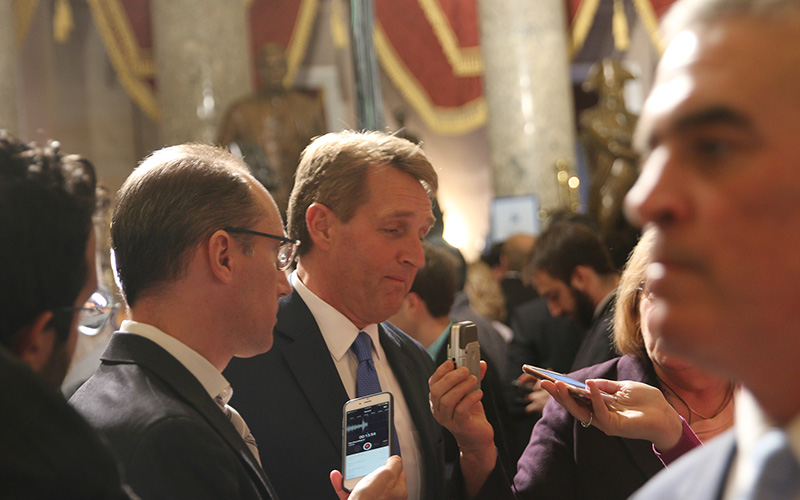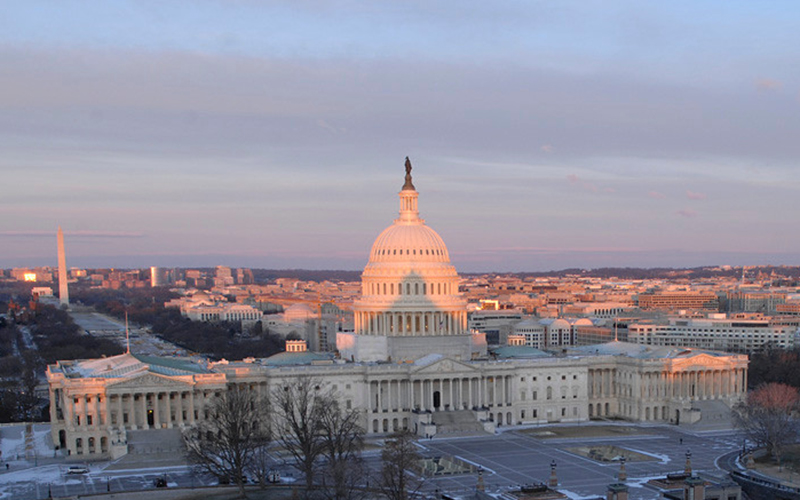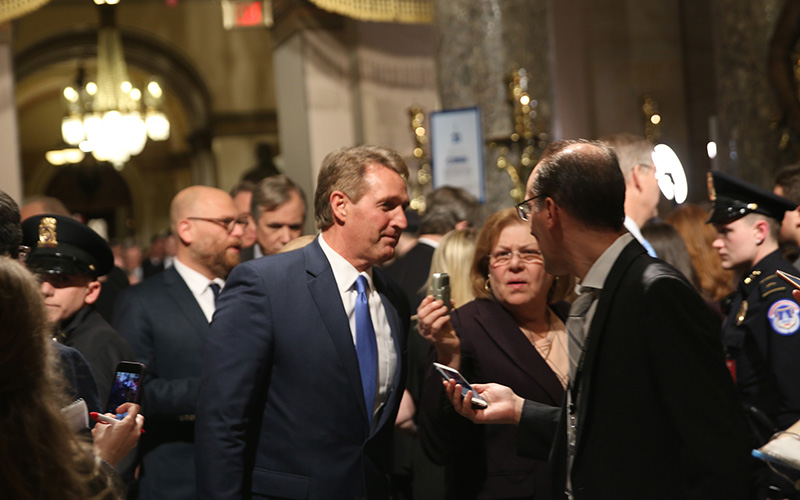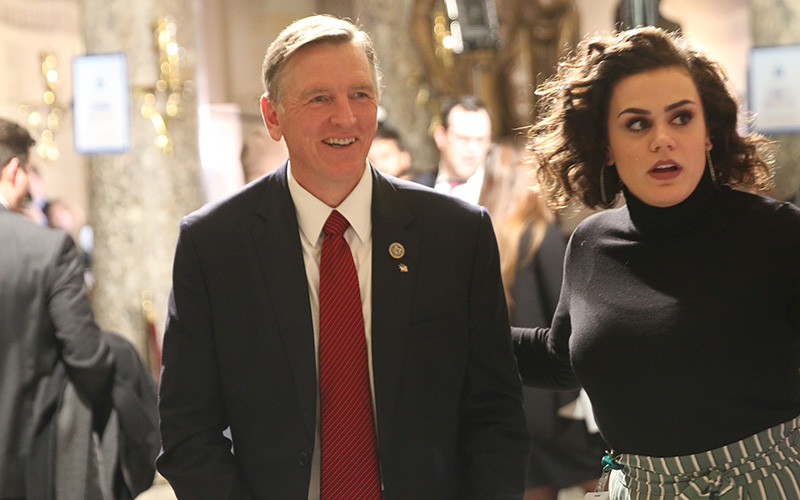WASHINGTON – The White House promised that President Donald Trump’s first official State of the Union address to Congress and the nation would be a unifying message, but Arizona lawmakers found little to agree on Tuesday.
The sweeping hour-and-20-minute speech was a litany of the administration’s achievements over the past year and a wish list of goals that touched on everything from ISIS to infrastructure to immigration.
“The state of the union is strong, because our people are strong,” a muted Trump said at the outset. His speech was interrupted scores of times by standing ovations – usually only by the Republican side of the House chamber, but occasionally joined by Democrats, as when he vowed to reduce the price of prescription drugs.
Some of the biggest applause lines for Republicans came when Trump pointed to the massive GOP tax cut he signed last month – which he credited for low unemployment, a booming stock market and new business investment – and the individual insurance mandate that “the core of the disastrous Obamacare.”
Rep. Andy Biggs, R-Gilbert, said in a prepared statement after the speech that under Trump, “the state of our union is indeed strong.”
“In the first year of his administration, President Trump has unleashed our nation’s limitless economic potential,” Biggs’ statement said, pointing to the GOP tax cut and reductions in federal regulations, among a list of other achievements.
But where Republicans hailed what they saw as a positive message, Democrats saw a speech shy on details – and they didn’t always like the details that they did see.
Rep. Tom O’Halleran, D-Sedona, said the president may have been too quick to claim credit for a strong economy.
See related story:
Gosar call to arrest ‘illegal immigrants’ at Trump speech causes stir
“Anybody would be crazy to say we don’t want a good economy in America, but to give one person credit for that when the tax cut just occurred,” O’Halleran said. “I’m happy for the American people, but this is not something that happened in a vacuum.”
One of Trump’s promises, calling for a massive investment in infrastructure, would be achieved in part by reducing government regulation that he said has held up projects, an approach derided by Rep. Raul Grijalva, D-Tucson, as “deeply unserious.”
“We’ve heard these same substance-free talking points about the miracles of deregulation for years,” Grijalva said in a statement released after the speech. “The president’s ‘plan’ is to use infrastructure to signal his contempt for environmental laws, not to create jobs or get anything done. This is deeply unserious and the American people know it.”
O’Halleran said he was concerned by the fact that the president is calling for $1.5 trillion in infrastructure, but not specifying where that money will come from. Trump said that in addition to streamlining the permitting process, any infrastructure plan would have “every federal dollar … leveraged” with state, local or private-sector funds.
-Cronkite News video by Ariana Bustos
“The infrastructure issue was light on detail,” O’Halleran said. “The $1.5 trillion mentioned that states and local government will have to pay a lot of money to get any federal dollars at all.”
O’Halleran said one overriding concern is “counting up the dollars that the president talked about.” But he also said he was disappointed in the president’s comments on immigration reform.
“On immigration, I didn’t hear him mention the word ‘Dreamers’ one time,” O’Halleran said. “Every time he ends a statement on immigration, he brings up the wall.”
A southern border wall, one of the central parts of Trump’s presidential campaign, is one of the key elements – and a key sticking point – in a four-pillar immigration plan the White House laid out last week and the president reiterated Tuesday night. That would offer a long-term pathway to citizenship for up to 1.8 million Dreamers – immigrants brought here illegally as children – in exchange for tougher border security measures, an end to the visa lottery system and a sharp reduction in family migration.
“I wanted to hear him address the issue of Dreamers, I wanted him to clearly identify what his program is. His four pillars are not a program,” O’Halleran said.
Trump’s claim that “chain migration” could let one legal immigrant “bring in virtually unlimited numbers of distant relatives” brought a low hiss from the Democratic side of the chamber.
Sen. Jeff Flake, R-Arizona, said the speech had what he described as “a lot of feel-good moments” but he was not thrilled by the president’s position on immigration.
“There were parts of it that were positive, other parts not so much,” said Flake, who has been heavily involved in Senate discussion on immigration reform. “On immigration, I would want a little more positive spin.”
But Cochise County Sheriff Mark Dannels, who attended the speech as a guest of Rep. Martha McSally, R-Tucson, said he welcomed the president’s push to strengthen the border, which sends a message that “I support and I respect what you guys do” patrolling the border.
“I thought it was refreshing,” Dannels of the speech, which he thought hit all the right points. “I know there’s division in this country. But if you take the political affiliation, the personal biases, and take that away, it was very beneficial.”
That reaction was echoed by McSally, who said the speech was “the right tone and vision at this time.”
“I thought this speech was inspiring, unifying (and) provided hope for the future,” McSally said. “Everyone who was listening should relate to what he was talking about.
“Why can’t Democrats and Republicans work together to support our military?” she asked. “We have very real issues that should be unifying for us as a country.”
O’Halleran credited the president for talking about bipartisanship, but said that “starts with the president.”
“There is no issue here of bipartisanship,” O’Halleran said. “The issue is that the president isn’t doing what he needs to bring us together.”
– Cronkite News reporters Philip Athey, Austen Bundy and Kyley Schultz contributed to this report.



